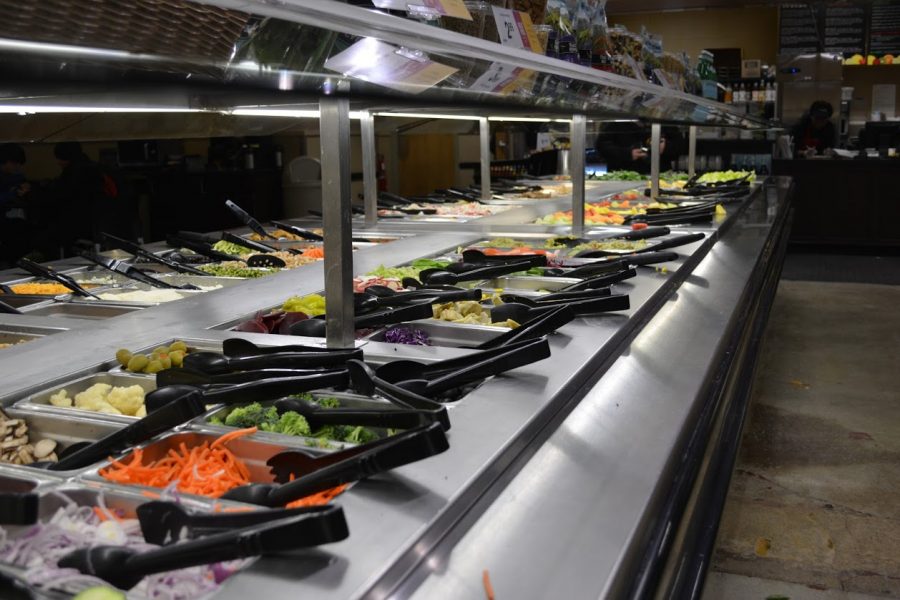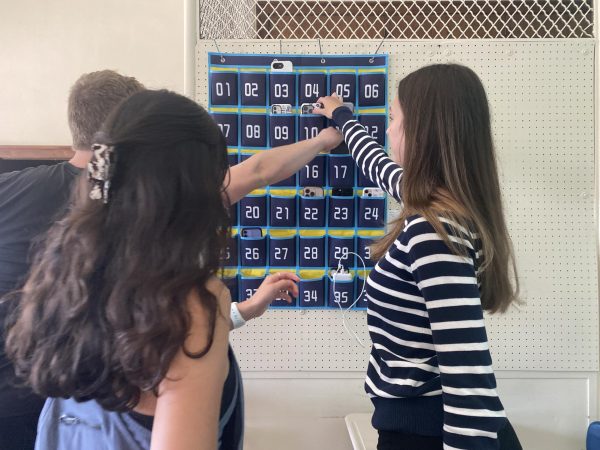Lunch for the limited
Mariano’s salad bar, one of the few vegan/vegetarian options available to Lane students.
Looking at the food options around Lane, there seems to be a demographic left out. Most restaurants have very few menu options for students who’ve eliminated meat and/or animal products from their diets, yet another barrier for healthier eating.
According to The Vegetarian Resource Group, about 0.5 percent of the youth population today are following a vegan diet. The comparison to youth following a vegetarian diet lies at 2 percent, increasing each year.
The type of environment and community a person lives in can affect their success in the following of any type of dietary plan. Whether or not it comes down to the resources, level of support, or even stigmas, the atmosphere surrounding pescatarian, vegetarian and vegan lifestyles remain somewhat controversial.
For students at Lane, accessibility to inexpensive and flavorful lunch options seem to be a “hit or miss.” It is no secret that the neighboring restaurant and fast food establishments have limited menu options for students wishing to go vegetarian, pescatarian, or vegan. Pescatarian Isaac Manesis, Div. 952, is familiar with a few.
“Pi-Hi is my favorite,” Manesis said. “They have great falafel. Chipotle and Potbelly also have some good options.”
Manesis has been following a pescatarian diet for the last nine years. His reasonings behind his decision are related to his health and environmental values.
“I began thinking about the implications of my diet as it affects my health, animals, and the environment,” Manasis said. “I realized that eating meat was a negative in all of those categories and decided to stop eating it.”
Manesis also said that he is fortunate enough to bring his own lunch everyday to school, usually a sandwich and some snacks. However, not all students have the accommodations to pack a school lunch.
Mr. Doll, who teaches AP Psych, has been a vegan the majority of his adult life. Doll understands that although he may be part of the vegan community at Lane, he has more advantages than some students in that he is able to prepare nutritious meals at home and keep them fresh with his personal fridge or microwave in his classroom.
“It’d be great if you guys had access to a fridge or microwave at school,” he said.
Mr. Doll also understands the limits placed on students eating off campus for lunch.
“The supermarkets are great but they don’t have composed dishes,” he said, listing off a variety of vegan friendly options around school.
“The salad bar, too. Mariano’s has a kale soup that’s vegan. Potbelly has a sandwich that you can make vegan. Mod pizza has a great vegan pizza,” Doll said.
Overall, Mr. Doll has had a positive experience as a vegan in the Lane community.
Abhishek Joshi, Div. 959, said his decision to be a vegetarian is related to his religious beliefs rooted in Hinduism.
Joshi said he does not consume any kind of meat, onion, garlic, or eggs.
“Growing up with a culture that preaches the importance of nonviolence, I grew extremely comfortable with the vegetarian diet and am proud to keep it every day.”
Lane seems to have established a “neutral environment,” according to Joshi.
“Although there is no major encouragement in the Lane community which advocates vegetarianism or becoming a vegan, people are still supportive of their friends who periodically seek to adopt such a diet,” Joshi said
With plant based dieting becoming increasingly popular amongst youth, it is clear that the restaurant industry has taken notice.
Around Lane, many of the hot spots for off-campus lunch have begun offering vegan and vegetarian substitutes and meals. For example, Mod Pizza offers soy cheese on their customized pizzas, Big Boy has a veggie burger on their menu, and Potbelly has a mushroom sandwich as well. This can be beneficial towards students and their possible desires to explore such lifestyles.
To anyone considering a vegetarian, pescatarian, or vegan change in their life, it is highly recommended to consult a doctor or nutritionist first. Understanding the motivations behind a possible elimination of animal products is essential in going about such a drastic change in diet.
Your donations directly fund the Lane Tech student journalism program—covering essential costs like website hosting and technology not supported by our school or district. Your generosity empowers our student reporters to investigate, write, and publish impactful stories that matter to our school community.
This website is more than a publishing platform—it's an archive, a research tool, and a source of truth. Every dollar helps us preserve and grow this resource so future students can learn from and build on the work being done today.
Thank you for supporting the next generation of journalists at Lane Tech College Prep!

Imani Fleming is a senior who is currently in her first year writing for The Warrior. Imani is interested in government and politics and is a member of...

Maggie Nielsen and has been writing for the Warrior since the fall of 2017. She is the president of Podcast Club, a member of Printmaking Club and runs...




